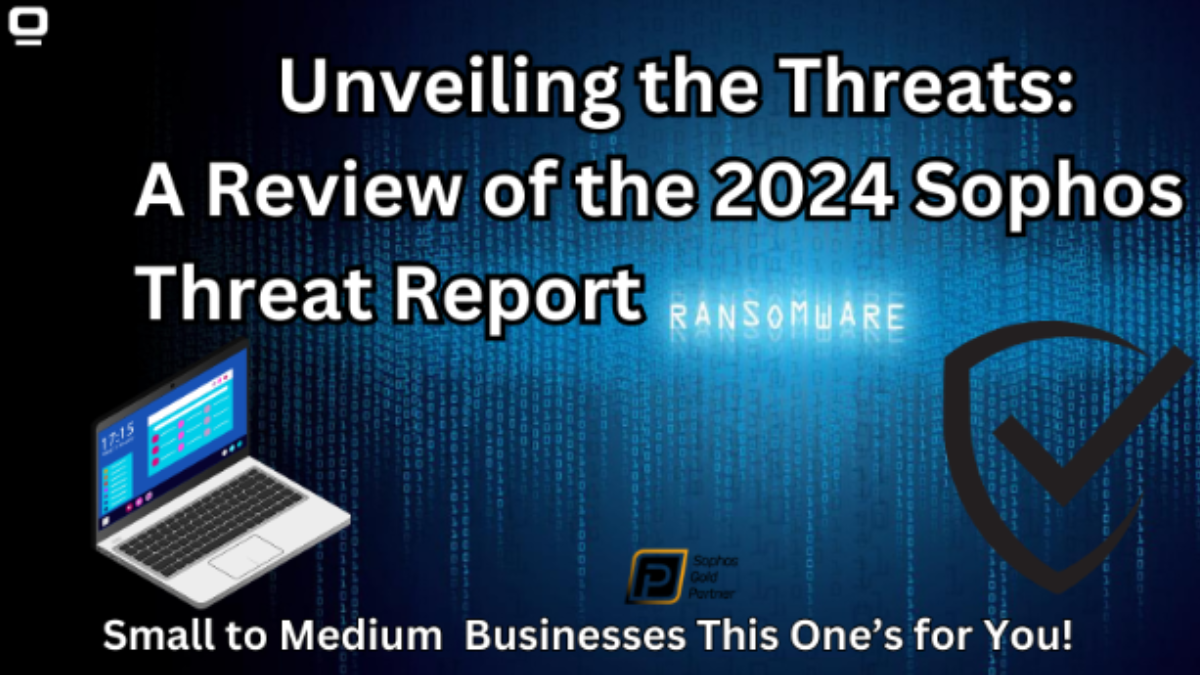
Unveiling the Threats: A Review of the 2024 Sophos Threat Report
In the digital age, small businesses are the lifeblood of our economy, driving innovation, providing employment, and contributing significantly to economic activity. However, with great innovation comes great vulnerability, as small businesses often find themselves at the forefront of cybercrime attacks. The 2024 Sophos Threat Report sheds light on the evolving cyber threat landscape, particularly concerning small and medium-sized enterprises (SMEs).
Ransomware: A Looming Threat
At the forefront of the cyber threat landscape remains ransomware, posing an existential risk to small businesses. Despite the growing sophistication of cyber defenses, ransomware attacks continue to plague SMEs, often resulting in significant financial losses and operational disruptions. The threat is real, and the stakes are high.
Small Businesses: The Bullseye for Cybercriminals
Cybercrime disproportionately impacts small businesses, which often lack the robust cybersecurity measures of larger enterprises. The fallout from cyberattacks can be devastating, with the cost of recovery potentially leading to business closures. Shockingly, over 75% of customer incident response cases handled by Sophos‘ X-Ops Incident Response service in 2023 were for small businesses, underscoring the severity of the issue.
Insights from Sophos’ Data Analysis
Sophos’ analysis reveals alarming trends in cybercrime targeting small businesses:
Data Theft: Malware targeting SMEs primarily focuses on data theft, with password stealers, keyboard loggers, and spyware comprising nearly half of all malware detections. Credential theft through phishing and malware poses a grave risk to sensitive data stored on cloud platforms and service providers.
Web-Based Malware Distribution: Cybercriminals have adapted their tactics, resorting to web-based malware distribution techniques such as malvertising and SEO poisoning to circumvent traditional security measures.
Unprotected Devices: Unprotected devices connected to organizational networks serve as primary entry points for cybercriminals. These include unmanaged computers, improperly configured systems, and devices running outdated software.
Abuse of Drivers: Cybercriminals exploit vulnerabilities in legitimate drivers or use malicious drivers signed with stolen certificates to evade malware defenses on managed systems.
Evolving Email Attacks: Email attacks have evolved from simple social engineering tactics to more sophisticated techniques, including engaging targets in email threads to enhance the credibility of lures.
Mobile Device Exploitation: Attacks on mobile device users, including social engineering-based scams and business email compromise, have surged, affecting individuals and small businesses alike.
Sophos’ Commitment to Cybersecurity
As a leading cybersecurity firm, Sophos relies on a comprehensive dataset, including customer reports, Managed Detection and Response (MDR) incident data, and Incident Response team data, to analyze and address emerging cyber threats. By leveraging this wealth of information, Sophos remains at the forefront of the battle against cybercrime.
Conclusion: Protecting the Heart of Our Economy
In conclusion, the 2024 Sophos Threat Report serves as a wake-up call for small businesses to prioritize cybersecurity. As cybercriminals continue to target SMEs with increasingly sophisticated attacks, proactive measures are essential to safeguard sensitive data and preserve business continuity. By adopting the recommended mitigation strategies and remaining vigilant against evolving threats, small businesses can fortify their defenses and thrive in an increasingly digital world.
Cybercriminals may target data, but with the right partnerships and defenses in place, SMEs can protect what matters most—their future. Contact Cyfer Tech today to discuss implementing Sophos in your business.
